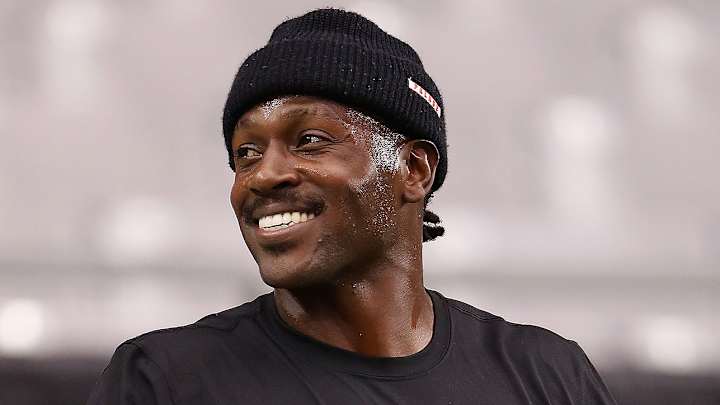Patriots Take a Risk on Signing Antonio Brown Because They Can

The Patriots are the NFL’s house, and signing Antonio Brown on Saturday afternoon was the ultimate example of a team playing with house money.
Yes, the seven-time Pro Bowler was sitting out there like a house in foreclosure, for at least an hour or two after he was cut by the Raiders on Saturday morning. Yes, any of 30 teams (assuming a return to Pittsburgh or Oakland was a no-go) could have made a bid for him.
But no one—and I’m emphasizing no one—could do it with less to worry about than Bill Belichick. Given how much risk is tied to signing Brown, that’s really the key. And that isn’t because the Patriots coach has a history of signing risky players that have worked out—it’s about history with those that didn’t.
The worst-case scenario for most teams just played out twice over nine months on opposite sides of the Lower 48. In December, Brown showed his power to send a contending team into total chaos, playing a role in causing a promising Steeler season to circle the drain before turning the team’s winter into a circus. This summer, Brown flexed the sort of impact he could have on a new program, hijacking Jon Gruden’s second camp back in Oakland.
That stuff is someone else’s problem but it’s not the concern of Belichick, and mostly because the risk he runs in acquiring Brown is a fraction of what it’d be elsewhere.
History shows that.
In 2010, the Randy Moss experiment imploded after three successful seasons. Moss departed the reservation during the opener, decrying a lack of appreciation (“Sometimes you want your boss to tell you that you’re doing a good job,” he said), then got into a confrontation with coaches at halftime of a Week 4 game in Miami. He was gone the day after that, traded to Minnesota for a third-round pick.
From there, the Patriots won 11 of 12 games, finished 14–2, and secured the first in a still-ongoing run of nine consecutive first-round byes. That, by the way, was a four-game improvement over the year before.
The following summer, Belichick moved to trade for Redskins DT Albert Haynesworth and Bengals WR Chad Johnson on the same day. The former was basically kicked out of DC by Mike Shanahan and was in the midst of a sexual-assault case, and the latter was purged in a roster reset by Marvin Lewis. Neither worked out in Foxboro. Haynesworth was cut that November, and Johnson finished the year with 15 catches at a need position for the Patriots.
That New England team went 13–3, finished the regular season on an eight-game win streak, and played in the Super Bowl, wrapping up the year five points shy of a title.
There are other examples of the Patriots operating amid dramatic situations too. The Patriots’ 16–0 team was playing beneath the shadow of Spygate, the Aaron Hernandez murders came to light ahead of a season in which the team went 12–4 and Deflategate was the precursor for more championships.
And yes, the Patriots’ intentions here are to avoid the potholes of the Moss, Johnson and Haynesworth situations. Plenty of their risks have worked out. Moss did, at first. Aqib Talib’s image was rehabbed completely in Foxboro and, since, he’s played in Super Bowls and served as a captain for the two franchises he’s played for. Corey Dillon and LeGarrette Blount had objectively terrible reps arriving in Massachusetts, and left with rings.
Maybe that’s how Brown’s situation ends up. I, like everyone else, have my doubts. Brown’s issue in Pittsburgh was his constant need for attention, and how the little things would set him off—and it only got worse in Oakland. So in the sort of demanding environment Belichick curates, will that disappear? We’ll see.
But hey, if anyone can make this work, it probably is the guy who can point to the trophy case in the face of any pushback, the guy with a plus-.500 record playing Father Flanagan to football’s wayward, and the guy with the authority to pull the plug on anyone (or at least anyone not wearing 12) without worrying how it looks to the public or to the owner that wrote every player’s signing bonus check.
And if doesn’t work? The Patriots, unlike most anyone else, will be OK.
Question or comment? Email us at talkback@themmqb.com.

Albert Breer is a senior writer covering the NFL for Sports Illustrated, delivering the biggest stories and breaking news from across the league. He has been on the NFL beat since 2005 and joined SI in 2016. Breer began his career covering the New England Patriots for the MetroWest Daily News and the Boston Herald from 2005 to '07, then covered the Dallas Cowboys for the Dallas Morning News from 2007 to '08. He worked for The Sporting News from 2008 to '09 before returning to Massachusetts as The Boston Globe's national NFL writer in 2009. From 2010 to 2016, Breer served as a national reporter for NFL Network. In addition to his work at Sports Illustrated, Breer regularly appears on NBC Sports Boston, 98.5 The Sports Hub in Boston, FS1 with Colin Cowherd, The Rich Eisen Show and The Dan Patrick Show. A 2002 graduate of Ohio State, Breer lives near Boston with his wife, a cardiac ICU nurse at Boston Children's Hospital, and their three children.
Follow AlbertBreer